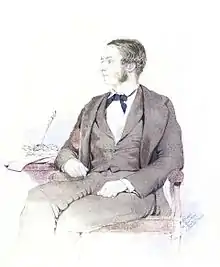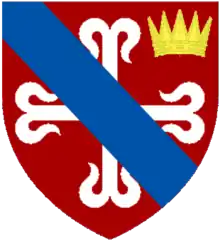Arthur Purves Phayre
Sir Arthur Purves Phayre GCMG KCSI CB (7 May 1812 – 14 December 1885) was a career British Indian Army officer who was the first Commissioner of British Burma, 1862–1867, Governor of Mauritius, 1874–1878, and author.
Sir Arthur Purves Phayre | |
|---|---|
 Portrait by Colesworthey Grant (1855) | |
| 12th Governor of Mauritius | |
| In office 1874–1878 | |
| Preceded by | Office established |
| 1st Chief Commissioner of Burma | |
| In office 31 January 1862 – 16 February 1867 | |
| Preceded by | Office established |
| Succeeded by | Albert Fytche |
| Personal details | |
| Born | 7 May 1812 Shrewsbury, Shropshire, England |
| Died | 14 December 1885 |
| Occupation | Administrator |
| Awards | Knight Grand Cross of the Order of St Michael and St George Knight Commander of the Order of the Star of India Companions of the Order of the Bath |
| Military service | |
| Allegiance | |
| Branch/service | |
| Rank | Lieutenant General |
His brother, Sir Robert Phayre (1820–1897), also served in India. They were part of the Phayre family, of which Lt Col Robert Phayre, who served the British administration in Ireland in the 17th century, also had the death warrant of Charles I addressed to him and two other Colonels.
Descendants: Colonel Robert Bernard Phayre MC 2/4th Prince of Wales Own Gurkha Rifles, son Colonel Robert Desmond Hensley Phayre Royal Artillery, son Lt Col Robert (Robin) Dermot Spinks Phayre LI, cousin Col Terence Peter Phayre Knott MC RM, of whom son Captain Robert Knott AAC changed name by deed poll to Phayre, to prevent family name dying out, lives in Kenya.
Early life
Phayre was born in Shrewsbury and educated at Shrewsbury School. He joined the Indian Army in 1828. In 1846 he was appointed assistant to the commissioner of the province of Tenasserim, Burma, and in 1849 he was made commissioner of Arakan. After the Second Anglo-Burmese War (1852), he became commissioner of Pegu. He was made a brevet captain in 1854 and in 1862 he was promoted to lieutenant-colonel.
Work
Government office
In 1862 Phayre was made commissioner for the entire province of British Burma. He left Burma in 1867.
He served as 12th governor of Mauritius from 21 September 1874 to 31 December 1878.[1]
He was appointed a CB in 1864, promoted to colonel in 1866 and was knighted with the KCSI in 1867. In 1871, he was promoted to major-general and was promoted to lieutenant-general in 1873. He retired to Bray in Ireland and was appointed a GCMG in 1878.
Naturalist
Phayre wrote the first standard History of Burma (1883). He is commemorated in the names of a number of animals, including:
- Phayre's leaf monkey, Trachypithecus phayrei
- Indochinese flying squirrel, Hylopetes phayrei
- Phayre's squirrel, Callosciurus phayrei
- Eared pitta, Pitta phayrei
- Brown Asian forest tortoise, Manouria emys phayrei [2]
- Ashy-headed green pigeon, Treron phayrei
Numismatist
Phayre collected coins (some are now in the British Museum collection), and in 1882 wrote Coins of Arakan, of Pegu, and of Burma, International Numismata Orientalia, part 8. The title page notes that he was a corresponding member of the Société Académique Indo-Chinoise. He was also a member of the Royal Asiatic Society.[3]
Arms
 |
|
References
- "Mauritius". World Statesmen.
- Beolens, Bo; Watkins, Michael; Grayson, Michael (2011). The Eponym Dictionary of Reptiles. Baltimore: Johns Hopkins University Press. xiii + 296 pp. ISBN 978-1-4214-0135-5. ("Phayre", p. 205).
- Obituary, in the JRAS Royal Asiatic Society. Proceedings of the Sixty-Third Anniversary Meeting of the Society, Held on 17 May 1886 Henry Yule The Journal of the Royal Asiatic Society of Great Britain and Ireland New Series, Vol. 18, No. 4 (Oct., 1886), pp. I-CLXIX Published by: Cambridge University Press Stable URL: https://www.jstor.org/stable/25208848
- "Grants and Confirmations of Arms Vol. G". National Library of Ireland. p. 181. Retrieved 22 January 2023.